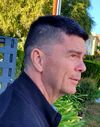What was that?

Time moves like the ocean currents. You can't see them move, but you feel the effects as you drift along.
Anchors
I like to say something happened ten years ago when it was 40 years ago in reality. Of course, ten years is a long time, but it's not accurate or valuable when I am mindful of marking the passage of time. So I have been thinking of how to visualize the past as half-lives.
"The days are long, and the years are short."
| Gretchen Rubin
My half-life was in 1992, and I was 30 years old. I was a very different person living in a world with mullets and balloon workout pants. When I talk to someone in their 30s or 40s, I have to make sure I consider their half-life was 2000, Y2K, and we were waiting around for planes to fall from the sky and the world to end. Anchors give us awareness and a way to be thoughtful about our choices of how to spend our time and relate to its passage.
"What can I say? Things tend to accumulate after Labor Day." | Litte Eddie - Grey Gardens
Rule of Relativity
The rule of relativity is my newest thought on keeping track of the past. The older I get, the more navigation buoys I need to place for the recent past. More pertinent events happened to my family and me in the last ten years that I need to be mindful of over anything in the previous decades. Or, as my husband calls our distant past, "The Time Before, Before." I need to monitor my memories and keep my navigation fresh to remain relevant. So I take the time to draw timelines to help me keep track of what I have been up to.
What I am reading this week
I finished part two of crime and punishment, which goes like this: fever, suicide, death, new clothes, love at first sight. I am starting part 3, and so far, it's about: threats, demands, shame, more demands, and fainting. The novel, Crime and Punishment was written in the 19th century, 100 years before I was born. I am fascinated by how close relationships described in the novel are to what we experience in modern life.
A question from James Clear. What habit will you wish you had started today when you look back on today from a year in the future?
